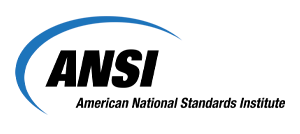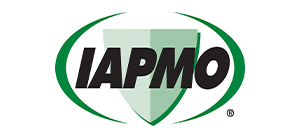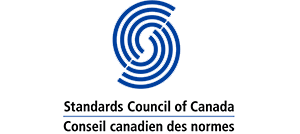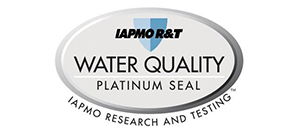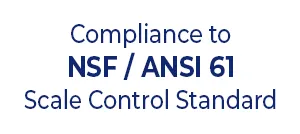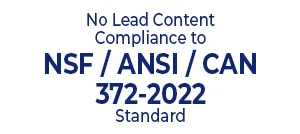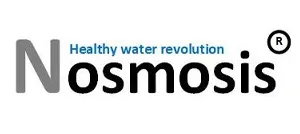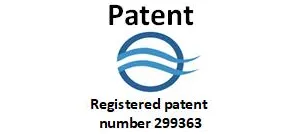Not all water filters are created equal—and when it comes to protecting your health, certification matters. Whether you’re trying to remove chlorine, lead, PFAS, or microplastics, choosing a water filter that’s certified by NSF or IAPMO ensures that you’re not just buying peace of mind—you’re getting proven performance.
So what makes a filter truly reliable? Let’s explore the gold-standard certifications and top systems that meet them.
What Are NSF & IAPMO Certifications—And Why Should You Care?
NSF International and IAPMO (International Association of Plumbing and Mechanical Officials) are two of the most recognized, accredited third-party organizations that test and certify water filtration systems against strict health and safety standards. While NSF develops the actual standards (like NSF/ANSI 42), both NSF and IAPMO are authorized to certify that a product complies with them.
The most important standards include:
- NSF/ANSI 42: Improves taste and reduces chlorine, odor, and particulates
- NSF/ANSI 53: Targets health-related contaminants like lead, cysts, VOCs
- NSF/ANSI 61: Ensures material safety in contact with drinking water
- NSF/ANSI 372: Confirms compliance with lead-free requirements
- NSF/ANSI 401: Reduces emerging contaminants like pharmaceuticals and PFAS
“NSF certification helps ensure that a water filter does what it claims—safely and effectively.” — NSF International
“IAPMO certification to NSF/ANSI standards offers the same credibility and protection, giving consumers another trustworthy certification route.” — IAPMO.org
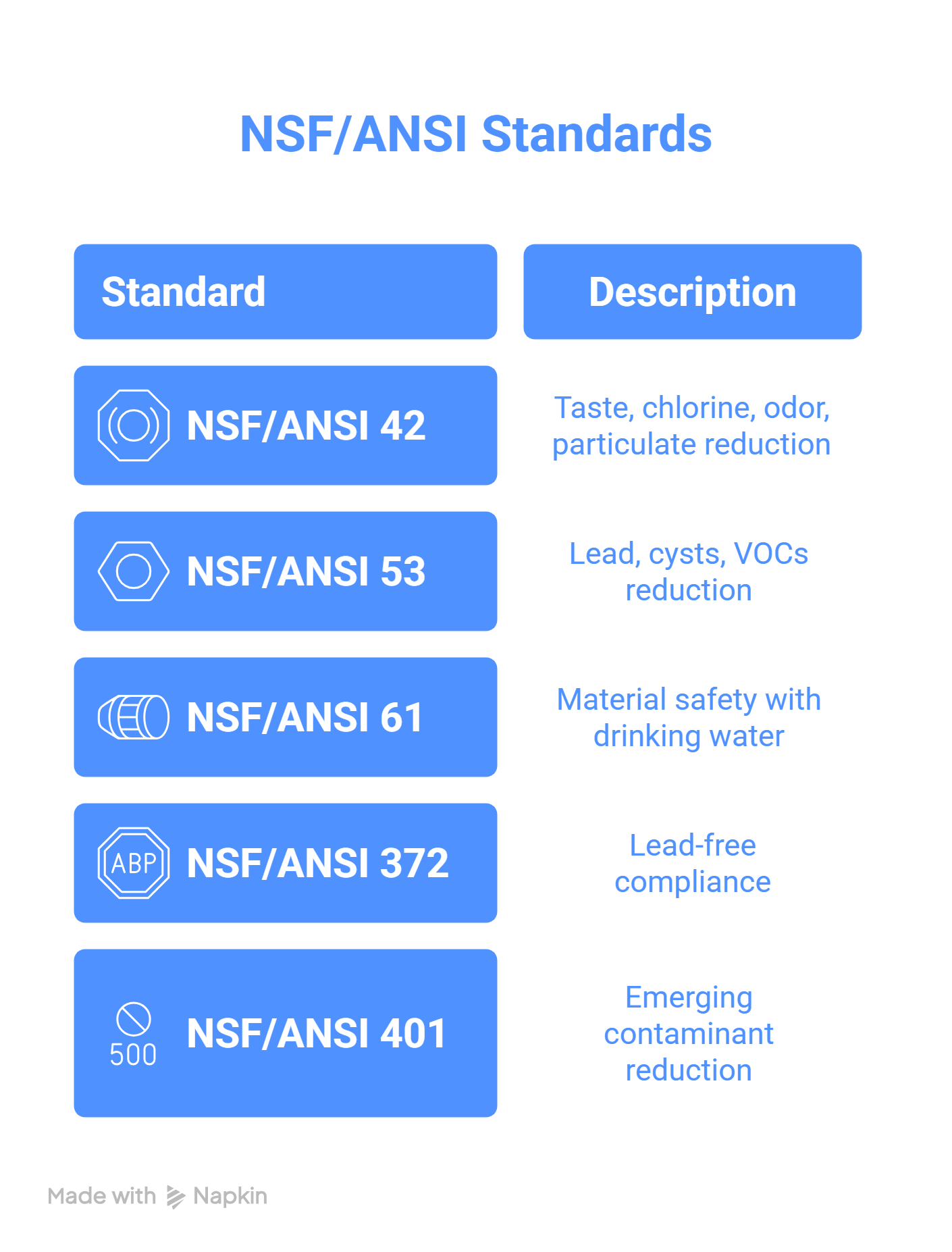
Top NSF & IAPMO Certified or Compliant Filters You Can Trust
Here are three leading systems with NSF/IAPMO certifications or compliance with NSF/ANSI standards, giving you certified protection for your home and health:
Pitcher Filter
NSF Certified: Standards 42 & 53
Best For: Affordable, easy-to-use everyday filtration
- Reduces chlorine, taste, lead, mercury, and benzene
- Certified directly by NSF
- Ideal for renters, students, and light use
According to the CDC, exposure to even small amounts of lead in drinking water can cause developmental issues in children and kidney problems in adults. Using certified filters is a key protective step (CDC, 2023).
TipaTech LotusDY Under-Sink Purifier
IAPMO Certified / NSF-Compliant: Standards 42, 61 & 372
Best For: Households that want advanced purification and mineral retention in every sip
- Filters down to 0.007 microns—reducing microplastics, viruses, heavy metals, and radioactive contaminants
- Releases harmful gases like radon, chlorine gas, and hydrogen sulfide, protecting both water and indoor air
- TDS-adjustment button lets users preserve or add beneficial minerals like magnesium
- Eco-friendly: no electricity, no water waste, and no sewer connection
- IAPMO-certified to comply with NSF/ANSI 42, 61, and 372
This filter combines elite protection with user control and sustainability—making it a standout for families, tech-forward homes, and health-conscious individuals.
TipaTech T-18 Whole House Filter
IAPMO Certified / NSF-Compliant: Standards 42, 61 & 372
Best For: Full-home protection—from the kitchen to the shower
- Reduces chlorine, sediments, pharmaceuticals, and heavy metals at the point-of-entry
- Helps reduce inhalation of volatile gases like chlorine and radon during hot showers
- IAPMO-certified for NSF/ANSI 42, 61, and 372
- Optional anti-radiation and magnesium cartridges
- Entirely chemical-free and electric-free operation
According to the EPA, whole-house filters can improve air and water quality by reducing both direct ingestion and inhalation of contaminants, especially in high-risk areas with aging infrastructure (EPA, 2023).
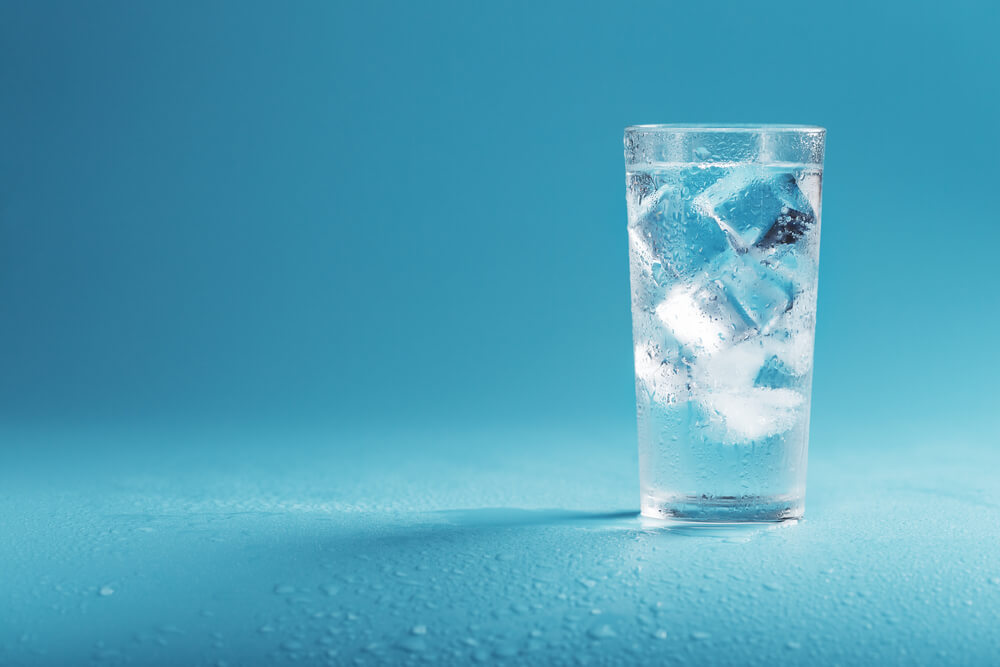
How to Verify Certification or Compliance
You can verify NSF certification via the NSF Product Listings Database.
IAPMO-certified filters, like TipaTech systems, can be confirmed through IAPMO’s certification listings.
Both databases allow you to look up product names, manufacturers, and specific standard compliance. If it’s not listed there—it’s probably just marketing.
Final Thoughts: NSF and IAPMO Are the Real Deal
In today’s world, where contaminants like lead, PFAS, and radon lurk in seemingly “safe” tap water, your water filter should be more than a guess—it should be guaranteed.
Choosing a product certified by NSF or IAPMO to NSF/ANSI standards ensures that your system has been rigorously tested for real-world performance, material safety, and health protection.
Final Thoughts: When It Comes to Your Water, Only Proven Filters Are Worth It
In a time when contaminants like lead, PFAS, and radon can be found even in “safe” tap water, a water filter isn’t a luxury—it’s a line of defense. Choosing a system certified by NSF or IAPMO to NSF/ANSI standards means it has been rigorously tested for real-world performance, material safety, and health protection. Whether you need a simple daily solution or a full-home purification system, make sure it’s certified and proven. When it comes to your health, that’s the only kind of filter that truly counts.
Water Filtration FAQs
Why is NSF or IAPMO certification important?
NSF and IAPMO certifications prove that a water filter has been independently tested for safety and performance according to strict health standards. They ensure the system does what it claims—reliably and effectively.
What is a Whole House Water Filter?
A whole house water filtration system is installed at the main water line where water enters your home. It provides filtered water to every faucet, shower, and appliance, removing contaminants like chlorine, sediment, rust, and harmful chemicals before they reach your plumbing.
How does a home water filtration system work?
Most systems use a multi-stage process: a sediment pre-filter removes dirt and debris, a carbon filter reduces chlorine and odors, and additional stages target specific contaminants like heavy metals, PFAS, and bacteria.
What contaminants can a whole house filter remove?
Depending on the system, it can remove chlorine, lead, PFAS, sediments, microplastics, bacteria, viruses, VOCs, radon gas, and more. Certified filters are tested to meet strict safety standards.
Do I need a water filtration system at home?
If your water has an unusual taste, odor, visible sediment, or if you live in an area with aging infrastructure, a filtration system is recommended. Testing your water is the best way to know for sure


